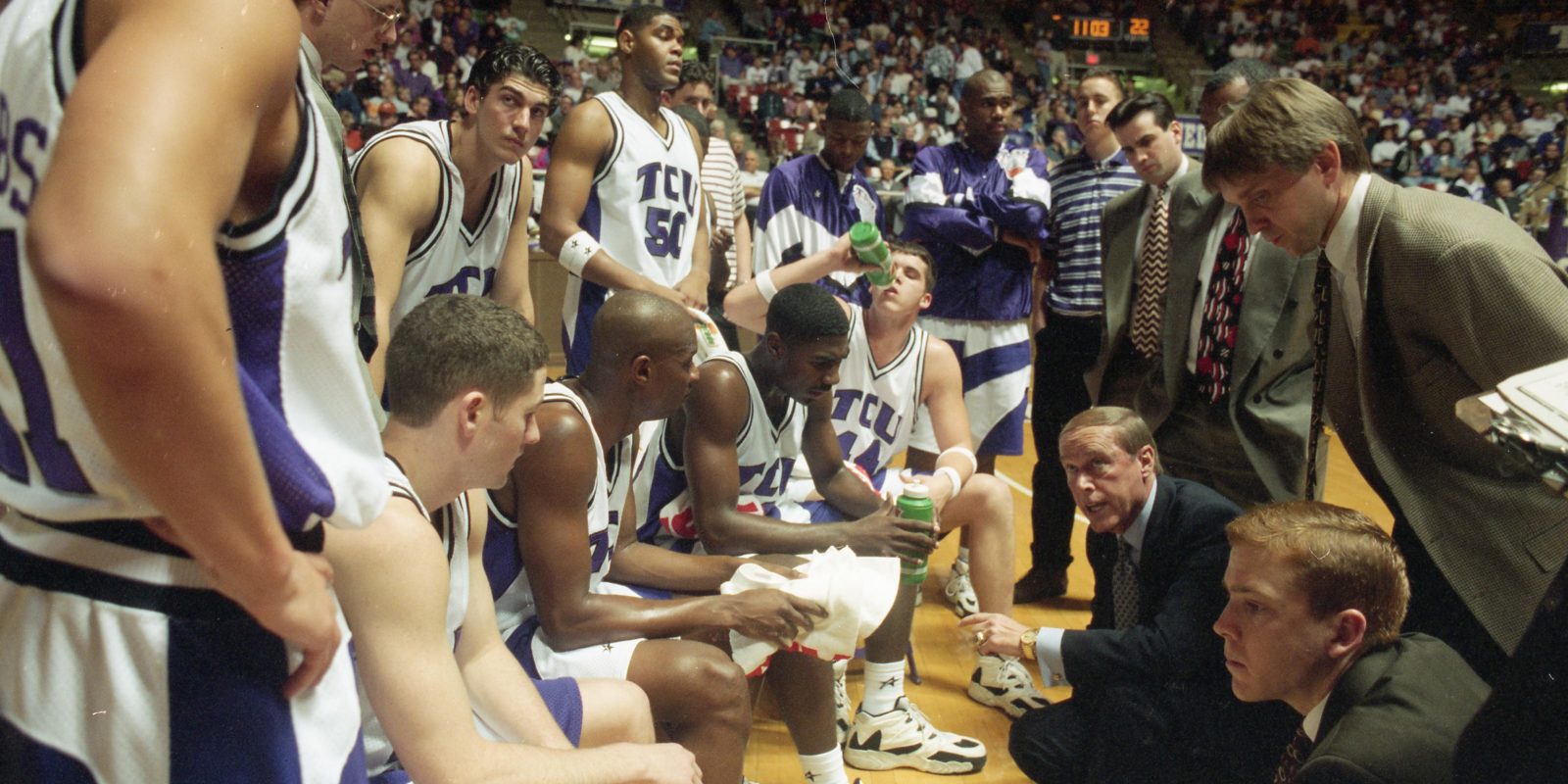
Courtesy of TCU Special Collections | Photo by Linda Kaye
Players and Fans Loved Frenetic Billy Ball
Under charismatic coach Billy Tubbs, TCU men’s basketball thrilled a city and led the nation in scoring.
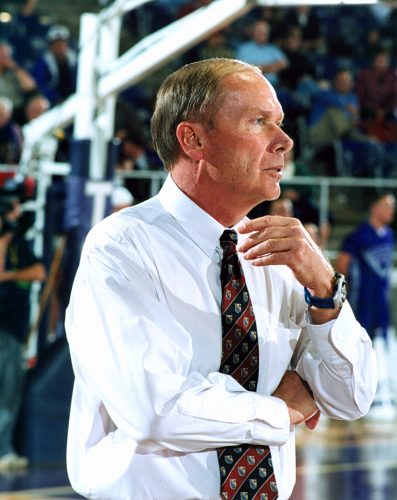
Billy Tubbs was notorious for running up the score on opponents. Courtesy of TCU Athletics
Every college basketball fan in the ’80s and ’90s knew about Billy Tubbs.
Small in stature and larger than life, Tubbs spent eight of his 31 head coaching seasons in Fort Worth.
Tubbs’ Frogs appeared twice in the National Invitation Tournament. TCU earned a fifth seed in the 1998 NCAA Tournament to cap a season when the team stormed to a 14-0 record in Western Athletic Conference play, and Tubbs was named the conference’s coach of the year.
Tubbs died on Nov. 1, 2020, at the age of 85.
“I think he was one of the first — if not the first — of the modern-day type of coach with that big personality that TCU had,” said Jack Hesselbrock ’82 (MBA ’86), former senior associate athletics director who worked for TCU Athletics from 1988 to 2018.
“With Coach Tubbs, you didn’t really ever go into a game thinking we didn’t have a shot at winning, and it didn’t matter” who TCU played, Hesselbrock said. “He drew attention to the sport, the school and the program. Wherever we went, it was, ‘Here comes Billy Ball.’ He made it fun.”
A National Treasure
When TCU hired Tubbs in 1994, the move shocked the college basketball world and electrified Fort Worth.
Hesselbrock was an assistant athletics director when a search committee began scanning the country for a head coach to replace Moe Iba. Until that point, he said, TCU Athletics preferred to hire uncontroversial, by-the-book coaches.
During the search process, several members of the committee reached out to Tubbs, then head coach at the University of Oklahoma — but only to ask the hardwood veteran for recommendations on people who might be a good fit for the TCU job.
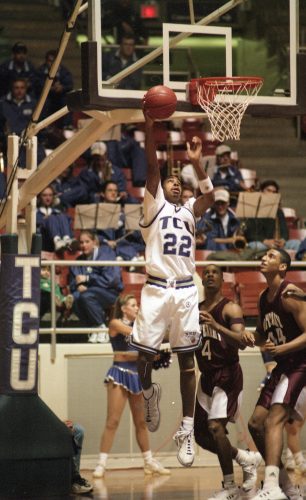
James Penny leaps for the basket in a game against Centenary College, Nov. 25, 1996. Courtesy of TCU Special Collections | Photo by Linda Kaye
Hesselbrock said Tubbs’ response to the outreach was, “Well, what about me?”
That Tubbs accepted the job was earth-shattering news, even to Hesselbrock.
“Provost [William Koehler] called me and said, ‘Could you round up the basketball players? We’re going to have a meeting today, and we’re going to introduce them to their new coach,’ ” he said. “He told me who it was, and I was stunned.”
Coming from a wildly successful Oklahoma program where he had spent the past 14 seasons, including eight consecutive NCAA Tournament trips, Tubbs was a hot commodity.
Before the time of Tubbs, TCU had gone to the Big Dance only six times — three times in the ’50s, in 1968, 1971 and then 1987, when current head coach, Jamie Dixon ’87, was a star guard.
“Coach Tubbs was a national name, and there was also a personality that went with it that was outside the box of TCU,” Hesselbrock said. “Not that Coach Tubbs didn’t have a good image, but he was out there as far as with the media and the crowd.
“He played up to it, and that was very new to TCU, but I’ve had some describe it as being the first step into the modern world of athletics for us as far as coaches,” Hesselbrock said. “From the word go, it was a different pace with Coach Tubbs.”
Sweet Success
Tubbs didn’t waste any time changing the game in Fort Worth. The Horned Frogs compiled 16 wins in his first season, after winning just seven games the year before.
From 1996 to 2001, TCU was a member of the then-mighty Western Athletic Conference, which housed powerhouse players who became NBA stars, including Utah’s Keith Van Horn and Andre Miller, UNLV’s Shawn Marion, New Mexico’s Kenny Thomas and Fresno State’s Rafer Alston.
Frog fans ate it up.
“There was tremendous support from season ticket holders and also from students because it was a show,” Hesselbrock said. “You knew that they were going to go up and down the court, and there was going to be 3-point shots, alley-oop jams.”
“Coach Tubbs was a national name, and there was also a personality that went with it that was outside the box of TCU.”
Jack Hesselbrock
Mike Jones III ’01, who played guard from 1996 to 1998, said the pressure to perform was on as soon as he transferred from Northeastern Oklahoma A&M College.
Tubbs led TCU to four 20-win seasons during its stint in the conference.
“Yeah, I was a little nervous,” Jones said. “We just came in and embraced it, and he embraced us. He was very positive, and he always told us to play with a purpose when we were out there.”
Jones raved about playing in Tubbs’ high-scoring offense and aggressive full-court press defense.
In the college basketball world, that game was known far and wide as Billy Ball.
Sure Shots
To earn time on the court, Tubbs’ student-athletes had to prove they could keep up with the pace of his game.
“If you weren’t able to get your timed mile, Coach would tell you [that] you weren’t ready to play,” Jones said.
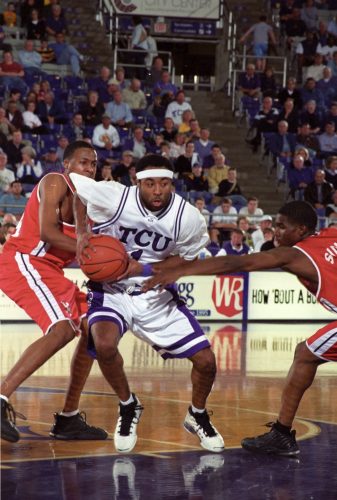
Nucleus Smith looks for an opening in a game against Houston, Feb. 31, 2003. Courtesy of TCU Special Collections | Photo by Linda Kaye
Nucleus Smith ’06, a guard from 2000 to 2004, said those mile runs occurred well before most of campus was even awake.
“He had us at the track at like 5:30 a.m. or 6 a.m.,” Smith said. “You had to warm up with a mile, then your sprints in between, and then you were going to end on a mile.
“And you better make your time or you were going to run [again] until you made it.”
Tubbs was out there running alongside the student-athletes.
“He was in great shape,” Smith said. “If it was a marathon, he’d beat you.”
Those workouts served a purpose in a style of basketball that required athletes to run up and down the court at a breakneck pace.
“It was the ultimate freedom,” Jones said. “You could run the floor, pass. If you were wide open and felt like you could make the shot, Coach wanted you to take it.”
Jones holds two of the program’s five highest single-game scoring records with 45- and 51-point outings. “Once someone got hot, Coach Tubbs would always be like ‘Milk the cow,’ ” Jones said. “So if you’ve got the hot hand, you knew you were getting that second and third shot.”
James Penny ’17, who played forward from 1994 to 1998, said he loved and learned from the program that Tubbs built.
The 1994-95 team’s 16-11 record was good for a third-place finish in the Southwest Conference.
“Slowly, Coach Tubbs was adding pieces to the team, and by my senior year,” Penny said, “we were one of the best teams in the nation.”
Hesselbrock said Tubbs was famous for extending zero mercy to his opponents. “There was a swagger and an aura of ‘We’re here to play ball, and we’re not going to play nice. … We’re going to try to beat you and beat you bad.’
“It was revolutionary and of course it appealed to players. He wanted 100 points a game.”
During the 1997-98 season, TCU finished first in the nation in points per game, averaging 97.2.
Softer Side
Tubbs was invested in the success of his players, on and off the court, Jones said. “He wanted us to be more than just basketball players.”
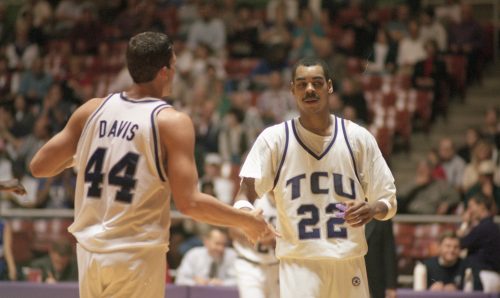
Dennis Davis and James Penny exchange kudos during a game against Boston University, Dec. 12, 1996. Courtesy of TCU Special Collections | Photo by Linda Kaye
Hesselbrock agreed that the coach had a unique strategy to keep student-athletes motivated in the classroom. “He didn’t sit you down and say, ‘Well, you need to study more or get a tutor in English.’ It was more of a subtle way of, ‘I’ve got a couple people I’ve recruited that could come in and take your spot if you don’t want to pass, so we can just move on down the line,’ and they would get the message.”
“Coach had a tough system,” Penny said. “You either got on board or he found someone else for the position.
“He might be tough on us, but it was always out of love and him wanting us to be better,” Penny said. “He saw the best version of us — even though many times we weren’t giving him the best version — and he was trying to get the best out of you for you, and I’ll always remember him for that.”
Hesselbrock agreed: “If you were part of what he considered his team, he was just as loyal and dedicated as you could want in a person.”
Tubbs often involved his family with the team, hosting holiday gatherings for players or pizza nights after big victories.
A text graphic that says, BILLY TUBBS’ STAT SHEET, 251 games as TCU coach, 156-95 record at TCU, Winning percentage = .622, Western Athletic Conference Coach of the Year, 1997-98, NIT appearances in 1997 and 1999, Fifth seed in the NCAA Tournament in 1998, TCU NBA picks under Tubbs: Lee Nailon and Kurt Thomas ’95
“It wasn’t just the coaches that were taken care of,” Hesselbrock said. “He reached out to everyone.”
Even on game days or when traveling long distance, Tubbs preferred to be around the team.
“On the road he ate with everybody and rode the bus,” Hesselbrock said. “I’ve been around where some coaches would rent and take a special car. No, he was right there in the middle of everything.”
Jones, who is now coach at St. Stephen’s & St. Agnes School in Alexandria, Virginia, credited Tubbs for instilling a powerful life lesson: “Play as hard as you can for as long as you can. … That’s one of the things I tell my players now because I feel like that’s a lost art in today’s game.”
Wise Guy
In December 1997, TCU faced off against the University of Kansas at Kemper Arena in Kansas City, Missouri, the same place where Tubbs had lost to KU in the 1988 NCAA Championship game.
Tubbs told the team to expect an intense contest and a loud, sold-out crowd. He knew opposing fans would be out to get him, and he was right.
“There was a lady behind our bench that from the tipoff to the end just heckled him like crazy,” Hesselbrock said. “Nothing ugly, no profanity, but just constant — ‘Billy, you’re washed up. We’re going to beat you again in here. You’re an old man; give it up.’ ”
TCU lost that game to Kansas 94-78. After the final buzzer, Tubbs walked over to find the woman in the crowd.
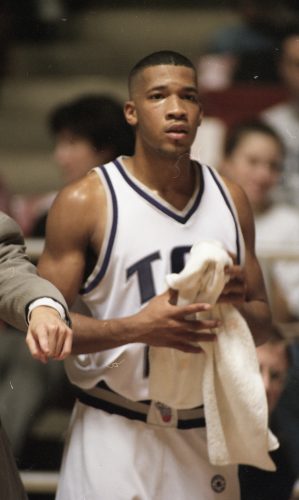
Mike Jones watches a play from the TCU sidelines in a game against McNeese State, Nov. 23, 1996. Courtesy of TCU Special Collections | Photo by Linda Kaye
Hesselbrock recounted what happened next: “He pulls the game program out of her arm, pulls out a pen and says to her, ‘So, you’re my favorite fan — who do I make my autograph out to?’ ”
The woman turned around, mortified. She tried to break free from the insults she had been hurling for the previous two hours.
“She’s like, ‘Coach, I didn’t.’
“ ‘No, you did,’ Tubbs fired back. ‘You’re from Kansas. You don’t like me, and you think I’m old and washed up, but I want to make sure I make this autograph out to you and spell your name right. I’m glad you noticed me and you had a good time, glad your team won.’ ”
Fun Times
Tubbs’ former student-athletes said they look back on their college days and appreciate the good memories.
“I remember one day he came to practice dressed like one of the players. Man, it was funny,” Smith said. “Coach could shoot too. Every time he would come in the gym, he would take one shot and would make it, all net every time.”
Penny, who is now an assistant coach for Soles de Mexicali and the head coach of the Tecate Vesa Seguridad professional basketball teams in Mexico, remembered the thrill of the 1997-98 season. “It didn’t end the way we wanted it to, but being back in the tournament and being one of the few teams that went to the tournament from TCU was a memory I’ll always cherish,” he said.
Smith said he would like to see Tubbs receive one final recognition: “He should be in the College Basketball Hall of Fame someday. I hope to see it one day soon.”
“I would say Coach Tubbs was genuine, and he wore his heart on his sleeve,” Jones said. “If he was down for you, he was going to be down for you. Coach Tubbs was one of a kind.”

Your comments are welcome
Comments
Related reading:
Campus News: Alma Matters
Billy Tubbs 1935-2020
Billy Tubbs’ up-tempo style of basketball became iconic for racking up points with a run-and-gun flair and full-court press.
First Person with … Jamie Dixon
Horned Frog Basketball’s favorite son is back, building an exciting future at what he calls “a new TCU.”
Features, Sports: Riff Ram
Horned Frog Basketball Wins NIT
A new coach and four senior believers lead TCU men’s hoops to new heights and the program’s first postseason tournament championship.